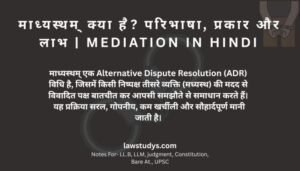This article has been told about juvenile crime. Who is a juvenile delinquent in law and the reasons for juvenile delinquency and how can they be kept at home? And what measures can be taken for child musicians, this has been discussed briefly,
if you are a lawyer, law student or preparing for the historical mountain test, then get the utmost information for and about your child candidates here –
Introduction – What is Juvenile Delinquency
In present times, juvenile crime has emerged as a very big problem in the society which is continuously spreading. Juvenile crime is known as a crime committed against children, which affects a large section of the society.
Juvenile crime refers to such crimes which happen against children and affect their present as well as future, due to which children are harmed physically or mentally.
In simple words, when a child does something against the law or society, then it is called juvenile crime which is also called juvenile crime or juvenile delinquency.
In juvenile justice laws, the word delinquency has been used in place of the word crime, because the society believes that children never commit crimes, their acts may be indecent, rude or reprehensible, but they can never be punishable.
In India, under the Juvenile Justice Act, 1986 (amended 2000), the anti-law acts committed by boys up to the age of 16 and girls up to the age of 18 come under the category of juvenile delinquency. It is a different matter that the maximum age limit of a juvenile delinquent may differ from state to country.
With regard to juvenile delinquency, we cannot consider age as the only determining factor; sometimes the severity of the crime also plays an important role, i.e. if a boy between 7 to 16 or a girl between 7 to 18 commits a crime for which the punishment is death penalty or life imprisonment, in such a situation we cannot consider them as juvenile delinquents, such as committing acts like murder, treason, fatal attack etc.
Read Also – Administrative Law: Detailed explanation of definition, nature and scope
Definition of Juvenile Delinquency
There is no universally accepted definition of juvenile crime (juvenile delinquency), while many criminologists have defined it in their own way, the main definitions of which are as follows –
According to Dr. M.J. Sethna – Juvenile crime includes the wrongful acts of a child or adolescent who is within the age prescribed by the law prevalent at that time.
According to Dr. P.N. Verma – Juvenile delinquency means neglect or violation of duties, a mistake.
According to Robinson – Juvenile crime means tendencies and activities like vagrancy, begging, mischief, misbehavior, insolence etc.
According to Siddiki – Doing an act prohibited by law for children up to the age specified by law is a juvenile crime and the child who is caught committing such a juvenile crime is called a juvenile criminal i.e. a delinquent child.
In the words of Caldnell – delinquency means such acts committed by adolescents which come under the protection of the state. Similarly, according to New Mexico law, a juvenile delinquent is a child who is habitually unruly, disobedient, or recalcitrant as a result of willful and persistent disobedience of the lawful orders of his parent or guardian, or who is a habitual runaway from home or school, or who habitually engages in conduct which endangers or injures the morals, health, or welfare of himself or others.
Read Also – What is Criminology : Introduction, Definition, Importance
Rubin has included such acts in relation to juvenile crime, if any of these acts are committed by children, they will be considered juvenile delinquents. Such acts are as follows –
(a) Disobeying any law, rule or ordinance,
(b) Indulging in immoral and obscene conduct,
(c) Company of immoral and unethical people,
(d) Wandering in notorious places,
(e) Patronage in brothels and gambling houses,
(f) Patronage in taverns,
(g) Unnecessarily roaming in the streets and lanes at night,
(h) Unauthorized boarding of train, bus or engine etc.;
(i) Continuously remaining absent from home or school,
(j) Using obscene language or behaving in public places,
(k) Sleeping or loitering in the streets,
(l) Begging, smoking and consuming intoxicants,
(d) Doing illegal business etc.
It is pertinent to mention here that the Act does not use a term like juvenile offender, rather the term delinquent juvenile was used in the Juvenile Justice Act, 1986 and presently even in the Juvenile Justice (Care and Protection of Children) Act, 2000, the term juvenile offender has not been used but juvenile in conflict with law.
Read Also – The ancient judicial system prevalent during the Hindu period in India before the arrival of the British
Causes of juvenile delinquency
There is no such class in the entire human civilization in which crime does not occur and among those crimes juvenile crime is a major problem because when a person gets involved in the world of crime from childhood, then there is no possibility of his improvement and contribution to the society, instead there is a possibility of increase in his crime with time.
Here it is important for us to know why a child commits crime and what factors are responsible for his committing crime, in this regard criminologists have given not one but many reasons for juvenile crime, on which research is still going on, which are as follows –
(i) Family environment
The first reason for child crime is considered to be the family environment. The child becomes what kind of environment he gets in the family. If a child gets a good environment in the family, then the child’s behavior also becomes good, whereas if he gets the opposite environment, he becomes a criminal, this is why the family is considered to be the first school of the child.
Children from a disrupted family are often considered to be of criminal nature, that is, in a family where there are no parents or guardians, or there is a divorce between the parents, or both the husband and wife are living separately, or the father stays away from home for a long time, there the children become undisciplined, because there is no one to control them.
Similarly, the ‘immoral environment’ of the family also contributes in making the child a criminal. In such families where the siblings are criminals, or the family members keep fighting among themselves, or the children are despised by the parents or step-parents, or prostitution, gambling, alcohol consumption etc. take place in the family, then it is natural for these to have a bad effect on the children.
Apart from this, the child being illegitimate, treating the child step-motherly, beating, living in crowded places etc. also become the causes of juvenile crime.
Also know – What are the elements of crime that constitute a crime | Elements of Crime in Hindi
(ii) Poverty
The second major cause of juvenile crime is lack of money i.e. poverty. When the financial condition of the family is weak, then the maintenance, education and needs of the children cannot be fulfilled and as a result, the children become victims of theft, begging or sexual crime.
According to Kuppuswamy (p. 423) – poverty is an important factor in developing criminal character in a child. Due to this poverty, many times inferiority complex starts developing in children and due to this inferiority complex they start moving towards crime.
(iii) Neglect
Neglect of children in the family is also an important reason for juvenile delinquency. When children do not get natural affection from parents, frustration develops in them and they become unruly and undisciplined.
In the absence of affection from parents, children are not able to develop self-confidence and due to this neglect, the needs of children are not fulfilled, due to which they start adopting criminal tendencies.
(iv) Physical reasons
When a child is physically handicapped, ugly, blind etc., then he is considered an object of ridicule in the society and inferiority complex also starts developing in such children.
Such children neither get employment nor are they able to get married and their self-esteem is also hurt. As a result, they start harming others to take revenge for their ridicule and in such a situation they become criminals.
(v) Mental deformity
Mental deformity of the child is also considered to be a major cause of juvenile crime. Due to mental deformity, children do not have the ability to think about their own welfare and harm and they are not able to differentiate between good and bad.
Their mental and intellectual development gets blocked. This is the reason why such children turn towards criminal acts like theft, begging, sexual relations.
(vi) Pornographic literature
Literature has a great impact on a person and his personality. The mind and behavior of a person becomes like the literature he reads. Good literature makes a person well-cultured, while pornographic literature makes children commit crimes like theft, adultery, prostitution by reading criminal sexual literature, detective novels, comics etc.
Apart from this, the erotic articles, obscene pictures, sexy stories etc. published in newspapers and magazines distort the mind of children and they become criminals. Thus it can be said that literature is both a boon and a curse.
(vii) Cinema, television and internet
Cinema, television and internet are also responsible for juvenile crimes. Many times obscene pictures and films are shown in cinema halls and on television due to which even innocent children become guilty. Such films and pictures have a bad effect on the character of children and they become criminals.
Many such cases keep coming in front of us, for example – a student of a school in Delhi (India) was caught making obscene pictures of girls on the internet, then action was also taken against him under the Information Technology Act, 2000.
(viii) Company
Company also has a great impact on a child. The child becomes like the company he keeps. If a child stays in the company of notorious criminals, then he also becomes a criminal.
This is the reason why a system of reformative punishment has been made for child criminals so that they can avoid the company of notorious criminals in jails.
With a view to reforming children, the Hon’ble Court has recommended in many of its cases that child criminals should be released on bail to save them from the company of notorious criminals in jails.
(ix) Political patronage
Political patronage and self-interest is also considered to be a major reason for the increase in child crimes. Politicians openly use school children for their self-interest. Strikes, vandalism, siege, violence etc. in schools mostly happen at the behest of politicians.
Child power (youth power) is openly misused in elections due to which the child becomes a criminal one day by being involved in such tendencies.
(x) Child marriage
Child marriage is also considered to be the cause of child crimes. Due to marriage at a young age, the boy or girl remains unaware of their marital duties and later they become victims of sexual crimes or commit sexual crimes.
They do not have a sense of responsibility towards their duties. Due to this, in the present times, child marriage has been declared voidable by the Hon’ble Court. (T. Shivkumar vs Inspector of Police, AIR 2012 Madras 62
How can juvenile crime be prevented
As we know that juvenile crime is a threat to the society which is making the future of children dark, in such a situation, many measures have also been considered to prevent juvenile crimes, by which juvenile crimes can be controlled –
(i) Family affection
Just as the first reason for juvenile crimes is the family environment, similarly the first responsibility of their prevention also lies on the family i.e. on the parents. Parents and relatives should give natural affection to their children, never treat them step-motherly, never beat or abuse them.
Apart from this, family members should pay attention to the education and fulfillment of their children’s needs, save their family from disintegration, do not let an immoral environment develop in the family and parents should avoid living with the family in very crowded places, etc. By following these things, children can be prevented from becoming juvenile criminals.
(ii) Economic condition
For the prevention of juvenile crimes, it is necessary to have a strong economic condition of the family. If the adults of the family remain employed, avoid debt, increase domestic businesses, do not shy away from labour, avoid unnecessary expenditure, then juvenile delinquency can be reduced.
When the economic condition of the family is strong, the minimum needs of the children will be fulfilled, immoral environment will not develop in the family, inferiority complex will not be born and self-confidence will be promoted.
(iii) Proper education
It is also expected that children should be given proper education. First of all, children should be sent to schools, they should not be allowed to remain uneducated, they should be taught character building, they should be made well-cultured and they should be inspired to be oriented towards faith in religion.
(iv) Healthy entertainment
Arrangements for healthy entertainment should be made for children. They should be shown movies that inspire them to be oriented towards character building and ideals.
Children’s parks should be set up in settlements and neighborhoods and means of entertainment should be arranged. It is also expected that children should be kept away from obscene movies, cinema halls and sexy moves.
(v) Good Literature
Good literature should be arranged for children. They should be kept away from obscene literature. Do not let spy novels, comics etc. come in their hands. Their access to inspiring stories of great men, religious books, character building literature should be made easy. For this, good libraries and reading rooms can be established in every village.
(vi) Rehabilitation
It is also necessary to make arrangements for the rehabilitation of neglected and runaway children. Children should be given employment oriented education and work in reform homes, employment opportunities should be sought for them. When the child is engaged in employment, he will not get the opportunity to go towards crime.
(vii) Establishment of Reform Homes
It is also expected that reform homes should be established to bring about reform in delinquent children so that proper arrangements can be made for the education, food, accommodation, medical treatment etc. of the children there.
It is heartening that the Juvenile Justice Act, 1986 and the Juvenile Justice (Care and Protection of Children) Act, 2000 have provisions for observation homes, special homes, children’s homes, shelter homes, foster care, aftercare etc. for delinquent children.
(viii) Political pollution
It is necessary to protect children from political pollution. Politicians should not use children for their selfish ends, should not use them in elections and should not instigate them for strikes, violence, closure, siege, vandalism etc. in schools.
(ix) Separate judicial system
There should be a separate judicial system for cases related to juvenile delinquents (delinquent juveniles). Under such a system –
(a) separate juvenile courts should be established,
(b) speedy trial should be done,
(c) there should be liberal arrangements for bail,
(d) opportunities for reform should be provided instead of punishment, and
(e) proper arrangements should be made for probation, reprimand, parole etc. (x) Psychological treatment
Delinquent children should be given psychological treatment. Experts in child psychology and psychiatrists should be asked to examine such children and suggest measures for their improvement.
By taking such measures, juvenile delinquents can be reformed and juvenile crimes can also be prevented.
Related Posts –
What is the Schools of Criminology And how many Types are there? – Criminology
Kautilyas Arthashastra : Essay on Contribution to the Ancient Judicial System of India
Note – Please share the content and updates related to the post.
Reference – Juvenile Justice Wikipedia




